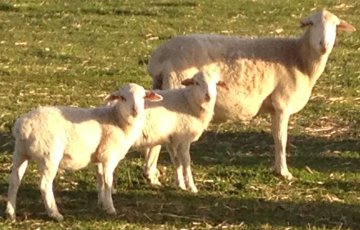
Cleanskin
Sheep
Information
Cross-breeds and Composites
In the past, the overwhelming majority of sheep in Australia were wool
Merinos. For many farmers, 'sheep' meant Merinos, and the all others were called "crossies", even if they were from a pure breed with a
long history. Most sheep in Australia are still Merinos, but meat lambs are now more profitable than wool for many farmers. Sires from
meat breeds have improved the meat lambs and the profits. Their lambs are 'cross-breds', and the ewes may be first or second cross.
Virtually every sheep breed has been developed through cross-breeding. A few old breeds have been 'pure' for a very long time, and almost all of them are horned. Horned sheep have some fans, but most farmers prefer polled stock. Merino flocks always had a few sheep which had a recessive poll gene. From hundreds of thousands of Merinos, farmers found enough with this gene to breed Poll Merino flocks.
Throughout the 20th century 'breeding out the horn' (or 'breeding to poll') continued in both sheep and cattle. As a result, very few modern breeds are really 'pure'. One after another, they were bred to poll by cross breeding to another polled breed. The aim was normally to keep all the genes of the original breed except the horn gene.
Virtually every sheep breed has been developed through cross-breeding. A few old breeds have been 'pure' for a very long time, and almost all of them are horned. Horned sheep have some fans, but most farmers prefer polled stock. Merino flocks always had a few sheep which had a recessive poll gene. From hundreds of thousands of Merinos, farmers found enough with this gene to breed Poll Merino flocks.
Throughout the 20th century 'breeding out the horn' (or 'breeding to poll') continued in both sheep and cattle. As a result, very few modern breeds are really 'pure'. One after another, they were bred to poll by cross breeding to another polled breed. The aim was normally to keep all the genes of the original breed except the horn gene.
The advantages of pure breeds:

Pure breeds are our agricultural history and heritage. Their breeders are the 'seed savers' of the domestic animal world.

Pure breeds keep their own unique genes, and genetic diversity may prove more valuable in the future than we can guess now.

Pure breed stock can always produce new crosses, with the commercial advantage of 'hybrid vigour'.

Flocks can be improved by selection (using new genetic tools to select the best breeding stock), without losing breed purity.

With pure breed stock, you always know what breed genes you are buying.
The advantages of composites:

Composites can combine the best genetic traits for any environment and any consumer preference. A farmer can choose the best breed mix to meet their own needs.

Better genetic traits can increase farm profits, improve animal welfare, and increase Australia's food production.

The new genetic tools for gene transfer from other breeds can produce quicker flock improvement than using selection alone.

Dorper x Damara
Body from the Dorper, hardy and lean from the Damara